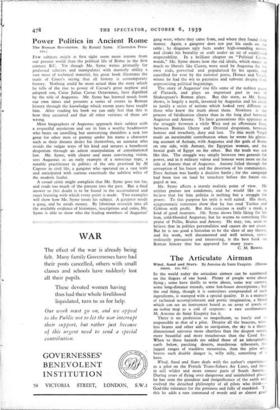Power Politics in Ancient Rome
FEW subjects might at first sight seem more remote from our present world than the political life of Rome in the first century B.C. Yet though Mr. Syme writes primarily for professed scholars and manipulates with masterly ability a vast mass of technical material, his great book illustrates the truth of Croce's saying that all history is contemporary history. Nothing could be more actual than the story which he tells of the rise to power of Caesar's great nephew and adopted son, Caius Julius Caesar Octavianus, later dignified by the title of Augustus. Mr. Syme has learned much from our own times and presents a series of events in Roman history through the knowledge which recent years have taught him. After reading his book we can only feel that this is how they occurred and that all other versions of them are wrong.
Most biographers of Augustus approach their subject with a respectful mysticism and see in him a worthy headmaster who bears on unwilling but unwearying shoulders a task too great for other men or portray under his name a character such as their dreams desire for themselves, an autocrat who avoids the vulgar ways of his kind and secures a beneficent despotism through an adroit manipulation of constitutional law. Mr. Syme, with clearer -and more convincing vision, sees Augustus as an early example of a notorious type, a notable practitioner in politics of the arts practised by Al Capone in civil life, a gangster who operated on a vast scale and anticipated with curious exactitude the subtlest wiles of the modern leader.
A casual critic might complain that Mr. Syme goes too far, and reads too much of the present into the past. But a-final answer to this doubt is to be found in the accumulated and exact learning with which every point is made. Two examples will show how Mr. Syme treats his subject. A gangster needs a gang, and he needs money. By laborious research into all the available evidence of historians, inscriptions and coins, Mr. Syme is able to show who the leading members of Augustus'
gang were, where they came from, and where they found their money. Again, a gangster does not put his cards on the table ; he disguises ugly facts under high-sounding names. and cloaks his brutality or craft under an air of established. respectability. In a brilliant chapter on "Political Catch- words," Mr. Syme shows how the old ideals, which meant so much to liberals like Cicero, were used by Augustus for his own ends, perverted and popularised by his agents, and sanctified for ever by the national poets, Horace and Vergil, whom he had the wit to patronise and subvent despite their unpromising political beginnings.
The story of Augustus' rise fills some of the noblest pages of Plutarch, and plays an important part in two of Shakespeare's Roman plays. But this story, as Mr. Syme shows, is largely a myth, invented by Augustus and his circle to justify a series of actions which looked very different to those who knew the truth about them. Nowhere is the process of falsification clearer than in the long duel between Augustus and Antony. To later generations this appeared as the struggle between a virile West and an effeminate East, between Roman liberty and Oriental despotism, between honour and treachery, duty and lust. To this myth Vergil made an inestimable contribution when he wrote his glitter- ing account of Actium, with Augustus and the gods of Rome on one side, with Antony, the Egyptian woman, and the bestial gods of Egypt on the other. But the truth was not like this. The struggle was simply between two generals for power, and in it military valour and honour were more on the side of Antony than of Augustus. Antony failed through the corruption of his forces and the desertion of his commanders. Even Actium was hardly a decisive battle ; for the campaign had been lost on land by treachery before the forces en- gaged at sea.
Mr. Syme affects a sternly realistic point of view. He neither praises nor condemns, and he would like us to believe that for him politics is nothing but a struggle for power. To this purpose his style is well suited. His short, epigrammatic sentences show that he has read Tacitus and Gibbon with profit. But this cynicism is really a mask, a kind of good manners. Mr. Syme shows little liking for his lean, cold-blooded Augustus, but he warms to something like praise of Pollio, Brutus and Antony. He may, too, seem to believe that in politics personalities and causes do not count. But he is too good a historian to be the slave of any theory, and his work, well documented and well written, extra- ordinarily persuasive and interesting, is the best book on Roman history that has appeared for many years.
C. M. Bowls.


































 Previous page
Previous page